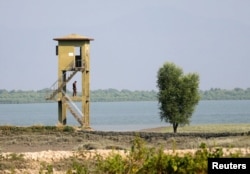A boat packed with 35 Rohingya Muslims, who were fleeing violence in Myanmar and were aiming to sneak into Bangladesh, capsized on a river leaving at least 29 people, mostly women and children, missing.
Several sources, including some fishermen and a survivor of the accident, reported that the boat capsized because it was loaded beyond its capacity.
After sailing out of Maungdaw township in Myanmar, the boat capsized during the early hours of Monday on the Naf River, which flows along the border of southeast Bangladesh and northwest Myanmar.
Fishermen help survivor
A 22-year-old Rohingya woman who took the boat from Myanmar along with five of her relatives said that after the boat capsized close to the Myanmar side of the border, she was desperate to cross over to Bangladesh and so she swam toward the Bangladeshi side of the border and landed on a deserted island.
"After the day broke, I called out for help when some Bangladeshi fishermen came and rescued me from the island. With around 35 people, almost all women and children, the boat was overcrowded, for which it drowned, I think," Rehena Begum, who fled Bor Gouzo Bill village of Maungdaw, said to local reporters.
After the Bangladeshi fishermen helped Rehena reach some of her relatives in a nearby village in Bangladesh, she knew that the bodies of three of her relatives, including her mother, had been recovered from the river in Myanmar and two others were still missing.
Rohingyas flee to Bangladesh
Mohammad Ali, a village administrator in the southeast Bangladeshi coastal town of Teknaf, said that several fishermen reported that they spotted three corpses floating in the area and they believed that they had been traveling on that boat.
"After speaking to many people we believe that five or six people, including Rehena Begum, have survived this boat tragedy. At least 29 of them are missing," Ali told VOA.
While the ongoing military crackdown, which began in Rakhine state in northwestern Myanmar following the killing of nine policemen in an armed attack on October 9, continues, reports of killings, rapes and other abuses have forced many Rohingyas from the area to begin fleeing to Bangladesh since last month.
Boats often overcrowded
Although Bangladeshi border guards have pushed back dozens of Rohingya-laden boats toward Myanmar in the past weeks, many Rohingyas have been entering Bangladesh, through some secret entry points, mostly with the help of some underground agent networks.
As many Rohingyas are desperate to flee Myanmar now, the agent networks, locally known as syndicates, are helping them land in Bangladesh, often riskily carrying them by overcrowded boats, said tourist guide Foizullah, who works in the southeast Bangladeshi coastal town of Teknaf and like many Rohingyas uses only one name.
“A boat which is not supposed to carry more than 20 people, are carrying 30 or even 35 passengers risking the lives of the children and women, most of whom don't know how to swim," Foizullah told VOA.
Bangladesh offers help
Last week, Bangladesh's Home Minister Asaduzzaman Khan Kamal said that “on humanitarian grounds” Bangladesh would allow some Rohingyas who are fleeing violence in Myanmar to enter Bangladesh.
"Facing troubles in Myanmar they are seeking shelter in Bangladesh. We shall try to host these people as long as possible," the minister said.
Sources in Myanmar said to VOA that after the Bangladeshi minister said his government would allow some Rohingyas to enter Bangladesh, more Rohingyas have begun attempting to cross over to Bangladesh.
"Three weeks ago about 500 Rohingyas were taking boats [from Rakhine] daily, aiming to land in Bangladesh," Korim Ullah, a resident of Ngasaku village in Maungdaw, told VOA over the phone.
“But for the past week, every day over 1,000 Rohingyas are fleeing Myanmar.”
At least 10,000 Rohingyas have entered Bangladesh in the previous weeks, the UNHCR reported last week. But several local sources said to VOA that the current figure in the case would not be fewer than 25,000.





